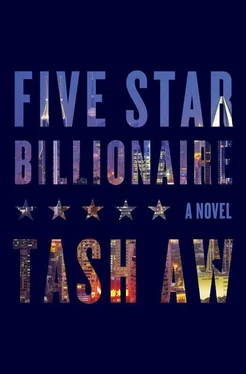The messages of support stream in from all over Asia. Girls of fifteen, sixteen, refusing to give up hope on Gary. I will always love you no matter what you do, because you are a beautiful human being. I refuse to believe Gary has done any of these things — his enemies are liars liars LIARS. Gary is an innocent of love’s dreams! Gary is a victim! I LOVE YOU GARY YOU ARE MY SPECIAL FOREVER .
He thought that he would be reassured by these messages, but he is not. Instead, they make him angry. He hates his fans. They refuse to see the truth; they are blind to how rotten his life has become. They still believe that he is a pure, innocent person who can make their pathetic lives happy and bring meaning to their paltry existences, when in fact the only sensation he is capable of provoking is disgust. He loathes them for needing him in this way, for needing him to supply them with dreams. He closes his eyes and feels their neediness weighing down on him like monsoon days, heavy and unmoving, ready to engulf him. Like everyone else, his fans think that the stories they read in the magazines and on the Internet are a joke, a fabrication of events not to be taken seriously. But they do not realize that even if they are exaggerations, distortions, made-up stories by pathetic people with no lives of their own, they are true in one respect: He has always been a disgusting person.
He kneels on the floor and looks at the patchwork carpet of papers and magazines strewn across the floor in front of him. He surveys what lies before him: all the words and images that sum up his entire life. The room around him is filthy — clothes cling to the silk upholstery like rotting vegetation, and there are dirty plates and cups everywhere. No one has come to clean the room in three days. Maybe it is because his manager has forbidden anyone to come in. Maybe it is because the cleaning people are afraid of Gary and fear that he will hit them or even sexually assault them. He is suddenly very tired, but climbing into the bed on the other side of the room seems too much of an effort. His limbs ache, and his face and neck feel clammy. He lies down on the floor, trying to find a soft pile of carpet, but the newspapers and magazines are too densely laid out and he ends up lying on top of them, curled up on his side in a little ball. They make a loud rustling noise every time he moves.
So in some ways all the reports of Gary’s troubled, mixed-up life today are a simple continuation of his troubled, mixed-up life before. We would all love to believe in a fairy-tale story of a village boy made good, becoming a world-renowned figure while retaining his simplicity and integrity, but the nature of our modern world is that everything is corruptible from the beginning; Gary is merely proof that purity and decay are entwined, that beauty is another form of depravity. Vanity has its price, and Gary is paying it right now. Every single one of his remaining concerts, including the major events in Shanghai and Beijing, have been canceled, and even the smaller venues in Xian and Fuzhou have been postponed indefinitely. Already, one of his major sponsors has canceled his endorsement contract, rumored to be worth RMB 10 million. Even as we speak, the posters of him smiling and drinking a can of soda are coming down from billboards across Asia. Others are certain to follow: You can’t advertise wholesome cow’s milk drinks if you are an alcoholic. No one will employ him anymore, and his young career appears to be over. His innocence, which was his Unique Selling Point — in fact, his Only Selling Point — is now lost, and there can surely be no comeback. Like a brilliant show of fireworks, he dazzled for a while but now leaves us contemplating the dark night sky. What will he do now? Might you turn up at your local real estate office a couple of years from now and find that Gary is your broker? Quite possibly. But should we be sad? Clearly not. He wanted this life, so we should not pity him for being where he is. Nor should we mourn the loss of his talent (though therein lies another debate: Was he actually talented or only pretty?). Others will soon come along to replace him, and others will fall just as he has. In a few years no one will remember him. So let us now leave this unfortunate young man to survey his broken career in peace and isolation. He deserves that much.
8. ALWAYS REBOUND AFTER EACH FAILURE

THE RESTAURANT WAS NOT YINGHUI’S CHOICE, BUT SHE WAS IMMEDIATELY struck by how appropriate it was. Set on the top floor of a handsome 1930s redbrick building on Shaanxi Nan Lu, its décor was rich, modern, and just a touch masculine — white-oak floors, French bergères , plum-colored rugs, and large paintings of swirly abstract shapes. It was the perfect setting for a first business meeting. Floor-to-ceiling windows all around the room offered a view of the maze of streets lined densely with plane trees and office blocks that sparkled in a jigsaw of lights in the night sky. The table was tucked away in a corner of the restaurant, discreet but not screened off from the rest of the room, unlike the private rooms that most rich businessmen favored. Its balance of intimacy and openness made her feel at ease. She thought, This man has class.
She had arrived early, as she always did for such meetings, in order to familiarize herself with her surroundings so that she would appear relaxed when the other person arrived. It allowed her a few moments to compose her thoughts, to think of a few opening lines that would make her seem funny yet assured — to assume control of the situation. The bigger and more important the rendezvous, the earlier she arrived, and this time she was nearly half an hour early.
She sipped the house cocktail she had ordered (Insensé, it was called) and looked in her handbag for her host’s card. It had made a striking impression on her when she received it, by courier, together with a handwritten note confirming the date and venue of their meeting. This had, of course, followed a concise email from his PA, which proposed a business venture that he would like to discuss with Yinghui — this man had perfect protocol, unlike most of the boorish men she had grown accustomed to dealing with. The name card was printed on thick buff-colored paper, with nothing but his name on it in English and Chinese, in scarlet ink: Walter Chao. No titles, posts, or qualifications, merely a phone number and the email address of his PA. The edges of the card were slightly uneven, a subtle hint at its handmade provenance, and she could easily imagine it having been crafted by an exquisite Florentine printer.
As she retrieved the card from her leather card case, another card slipped out with it. JUSTIN C. K. LIM, it read, listing his various positions in the family conglomerate he headed. She had not thought much about him since she’d run into him at the awards ceremony several weeks before; she had decided, consciously, to put him out of her mind for good. And yet she was at a loss to explain why she had not thrown out his card, why she had not been able to cut away the association with her past, why she was not being her usual ruthless self. She looked at the even, standard size of the card and considered its banality. Even the company logo was dull — his grandfather’s initials, L.K.H., squashed into a square, as if designed by a middle-schooler in art class. Over the years, she had read and heard of Justin C. K. Lim’s entrepreneurial skills, but as a person he had always been somewhat pedestrian. He spoke infrequently, and what little he did say was leaden, weighed down by platitudes. She remembered a discussion among friends in Kuala Lumpur a long time ago, about the Israeli-Palestinian conflict. It became quite heated; they were all young and idealistic. And every time they asked Justin C. K. Lim what his opinion was, he said, “Well, I think every country has a right to a peaceful existence,” or, “Both countries have valid arguments, don’t they?” or, when pushed, “I don’t really know much about that.”
Читать дальше
Конец ознакомительного отрывка
Купить книгу



![Scott O’Hara - Five-Star Fugitive [= Border Town Girl]](/books/432138/scott-o-hara-five-thumb.webp)









